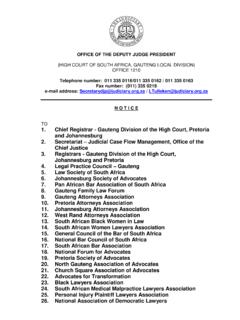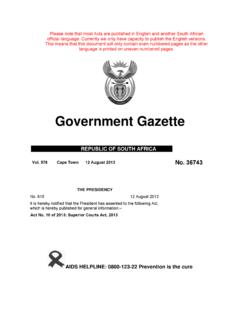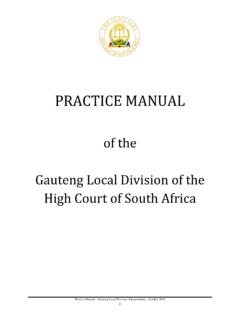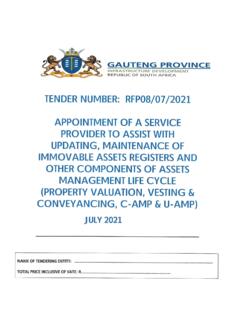Transcription of REPUBLIC OF SOUTH AFRICA IN THE HIGH COURT OF …
1 1 SAFLII Note: Certain personal/private details of parties or witnesses have been redacted from this document in compliance with the law and SAFLII Policy REPUBLIC OF SOUTH AFRICA IN THE high COURT OF SOUTH AFRICA gauteng DIVISION, johannesburg case NO.: 15986/2016 In the matter between: M.: K. PLAINTIFF and M.: C. (BORN H.) DEFENDANT Heard:13 November 2017 17 November 2017, 15 December 2017- 22 December 2017, 8 January 2018 10 January 2018, 12 January 2018 Delivered: 22 January 2018 (1) REPORTABLE: YES / NO (2) OF INTEREST TO OTHER JUDGES: YES / NO (3) REVISED _____ _____ DATE SIGNATURE 2 JUDGMENT _____ Coram: VAN DER SCHYFF AJ Introduction [1] The parties cited in this matter seek a decree of divorce. It is common cause that they were married to each other in community of property on 17 November 2011 at johannesburg .
2 Two boys who are currently respectively 6 years and 7months, and 3 years and 5 months old, were born from this marriage. [2] The parties have agreed prior to the onset of the hearing that a liquidator will be appointed to facilitate the division of the joint estate. [3] Since the parties agree that the marriage has irretrievably broken down (a fact attested to by the evidence presented by both parties) the remaining issues that need to be adjudicated are the maintenance of the defendant, and the maintenance of the two minor children, and the appropriate post-divorce care and contact regime pertaining to the two minor [4] Both parties agreed that it would be in the best interests of the minor children if both parties retain full parental rights and responsibilities in respect of the minor children as 1 Section 6(1)
3 Of the Divorce Act, No 70 of 1979, prescribes that a COURT may only grant a decree of divorce if the COURT is satisfied that satisfactory provisions are made or contemplated with regard to the welfare of any minor child, or that the provisions made or contemplated are the best that can be effected in the circumstance. Section 6(3) of the Act provides that a COURT , when granting a decree of divorce, may in regard to maintenance, or custody or guardianship of, or access to, a minor child make any order which it may deem fit. It goes without saying that this wide discretion must be exercised judicially and in accordance with the principles of the law. Section 1(2) of the Children s Act, No. 38 of 2005, determines that in addition to the meaning assigned to the terms custody and access in any law, and the common law, the terms custody and access in any law must be construed also to mean care and contact as defined in this Act.
4 3 envisaged by section 18 of the Children s Act, No. 38 of 2002 (hereafter the Children s Act). [5] The trial was conducted over a period of 14 days and concluded on Wednesday 10 January 2018. During this period evidence was heard from the plaintiff, two expert witnesses called by him, Dr. Martin Strous, and Prof. Lorna Jacklin, the defendant and the witnesses called by her - Ms. Chantelle Anderson, the head mistress of the Montessori school attended by the parties eldest son T., and two expert witnesses Dr. Deidri Kruger and Dr. David Benn; and the Family Councillor, Ms. Naidoo, and Family Advocate, Adv. Maikoo. The matter was adjourned until Friday 12 January 2018 for closing arguments. Counsel were requested to prepare and submit heads of argument. Both counsels heads of argument provide a good indication of their respective submissions on how the evidence lead in the case support their respective cases.
5 Counsel for the plaintiff also provided me with an extensive bundle of authorities. I am indebted to both counsel for the analysis of the evidence. Background [6] The plaintiff instituted divorce proceedings during May 2016 and sought from the onset an order that the minor children s primary place of residence shall be with him. The defendant did not oppose the granting of a decree of divorce, but in her counterclaim sought an order that the minor children s primary place of residence shall be with her in Germany and that she be granted leave to depart from SOUTH AFRICA permanently together with the two minor children. The implication of the pleadings as they stand is that both parties request the COURT to order that the primary residence of the children vest with them, within the context that if the children s primary residence is ordered to be with the defendant, it will effectively sanction the relocation of the children to Germany.
6 [7] It was only during the trial that the plaintiff advanced the proposition that a shared residency regime would be in the best interests of the children. Despite this apparent change of heart, neither the final draft order submitted on behalf of the plaintiff as part of the plaintiff s counsel s heads of argument, nor the argument contained in the plaintiff s counsel s heads of argument, promote a shared residency regime. Since the COURT is however obliged to make an order pertaining to care and contact that is in the best 4 interests of the children, I am not bound by the parties preferences and, if circumstances dictate the need to implement a shared residence regime in the best interests of the children, in circumstances that allow therefore, such an order would follow. [8] During the hearing the plaintiff advanced the argument that the defendant s proposed relocation is entirely at her election and that the defendant is not considering the best interests of the children in contemplating the relocation, but endeavouring to frustrate a possible shared residency arrangement and alienate the children from the plaintiff.
7 Such a contention is unsupported if viewed from the perspective that plaintiff, in his summons, claimed that the minor children s primary place of residence should be with him, without entertaining, even in the alternative, the possibility of a shared residence agreement. The plaintiff s claim that the minor children s primary residency must vest with him was reiterated during opening argument. Although the plaintiff testified during cross-examination that the relief as claimed in the summons was directed at obtaining primary residence of the minor children due to the fact that the defendant has threatened to take the children to Germany even before the divorce was instituted, it is insightful to note that the allegations made by the plaintiff in the summons, would, if substantiated, require any COURT to seriously consider granting the sole residence of the minor children to the plaintiff.
8 The allegations are directed at the defendant s ability and suitability to act as the minor children s caregiver. Allegations are, inter alia, made that the defendant is abusive, aggressive, and emotionally unstable, that she neglected the interests of the minor children, and through her behaviour placed the minor children at risk. The content of the summons issued by the plaintiff does not support the contention that was raised during his testimony that a shared residency regime is what he was seeking or that such a shared residency regime would be in the best interests of the children. [9] However, in the light of the contention that the defendant s elected relocation is selfish and occasioned in an effort to not only frustrate the contact between the plaintiff and the children but also to alienate the plaintiff and the children, and specifically in light of the fact that Dr Strous, the plaintiff s main expert witness, said in no unclear terms that if the defendant cared about the best interests of the children she would not even consider relocation, it is imperative, at the outset, to contextualise the defendant s request to be allowed to relocate the children with her to Germany.
9 5 [10] It is common cause that the defendant is a German citizen who is currently residing in SOUTH AFRICA in terms of a relative s visa (spouse). The defendant has been residing in SOUTH AFRICA since The conditions of the current relative s visa are that the defendant must reside with SA citizen [..] (the plaintiff), and she may not conduct work. This visa expires on 3 February 2018. [11] I am of the view that the defendant s status as a foreigner, whose permission to remain in the country is soon expiring, creates a unique context within which the question of the children s primary residence must be determined. When the defendant s visa that permits her to stay in the country expires, she is obliged to leave the country. Although it has been canvassed by the plaintiff that there was (and is) an option open to the defendant to obtain ministerial consent to remain in the country after the expiry of the relative s visa and the divorce, no proper case was made out in this regard: [ ] The defendant was asked in cross-examination whether she endeavoured to obtain legal advice to prolong or secure her stay in SOUTH AFRICA .
10 She testified that she did not because she was advised by two separate professionals that there was no good prospect of success because she does not have any special [ ] During closing argument plaintiff s counsel argued that s 31(2)(b) of the Immigration Act No. 13 of 2002 provides an option that could be utilised by the defendant. (The applicability of s 31(2)(b) was canvassed to a certain extent during the trial.) [ ] Although plaintiff s counsel did not address me on s 27 of the Immigration Act, neither referred to s 27 at any time during the trial, she also incorporated a copy of s 27 of the Act in the heads of argument. Section 27(g) provides that the Director-General may, subject to any prescribed requirements, issue a permanent residence permit to a foreigner of good and sound character who is the relative of a citizen or permanent resident within the first step of kinship.



















